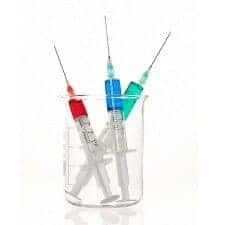A new study suggests that confidence in government may play a key role in the public’s willingness to get at least some vaccines.
The study re-analyzed national survey data from 2009 that examined Americans’ views on a then-new vaccine for the H1N1 virus – commonly known as swine flu.
Results showed that Republicans and independents were significantly less likely than Democrats to say they would get the vaccine. But it wasn’t their political affiliation itself that was driving Republican and independent views, said Kent Schwirian, professor of sociology at The Ohio State University.
“It’s not that Republicans reject vaccination because of their conservative views or exposure to certain media,” Schwirian said.
“It was their lack of confidence in the government to deal with the swine flu crisis that was driving their anti-vaccination views.”
The study found that people trusting the government’s ability to deal with the epidemic were almost three times more likely to take the vaccine than were others.
Schwirian conducted the study with Gustavo Mesch, a Ph.D. graduate of Ohio State who is now a professor of sociology and Dean of the Faculty of Social Sciences at the University of Haifa in Israel. Their results appear online in the journal Health Promotion International and will be published in a future print edition.
The results may apply to the current measles outbreak that started in southern California last year, Schwirian said. Some research has blamed the outbreak on clusters of people in politically liberal areas who didn’t vaccinate their children.
But Schwirian doesn’t necessarily see any conflict between these results that find Republicans were less likely to accept vaccines and current work that finds Democrats who are against vaccine use.
“I believe it is a lack of confidence in government – not political affiliation — that may unite the anti-vaccination people in our study with those from today,” Schwirian said. “Even in our study, about a third of Democrats said they were not likely to get swine flu vaccine and many of those had low confidence in government.”
For this newly published study, the researchers did a secondary analysis of the Pew Research for the People and Press survey from October 2009. The Pew institute conducts regular surveys of public opinion, and this survey asked about the willingness of Americans to take the swine flu vaccine. A total of 1,000 people were surveyed.
During the winter of 2009-2010, the swine flu was a big deal, Schwirian said. The World Health Organization declared the outbreak the first worldwide pandemic in more than 40 years. In the United States, the virus killed 12,500, hospitalized 275,000 and sickened 61 million.
A vaccine was developed, but during the winter of 2010 the vaccination program became a heated public issue and the number of people who said they would get the vaccine plummeted.
Overall, only 50.4 percent of those who participated in the Pew survey indicated that they would take the vaccine.
A larger percentage of Democrats (63.7 percent) were willing to take the vaccine than Republicans and independents (both about 43 percent).
Nearly 60 percent of those with confidence in government were willing to take the vaccine, compared to 32 percent of those with less confidence.
Those who watched more news were also more likely to want the vaccine.
When the researchers used a statistical model to analyze the data, they learned that confidence in government was the driving force in vaccination views.
Those distrusting the government’s ability were more likely to be older, middle income, politically conservative and less likely to follow media reports about the outbreak.
“Republicans were the most likely to have less confidence in government, so that’s why we saw this strong relationship between Republican affiliation and skepticism about the swine flu vaccine,” Schwirian said.
This survey didn’t ask about participants’ trust in science and medicine, which may also be related to views on vaccines, he noted. “But this finding is certainly consistent with studies that have shown that the confidence of political conservatives in science has decreased in recent years.”


